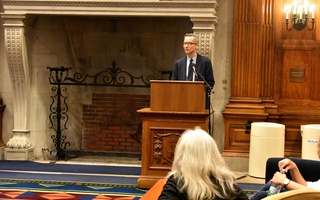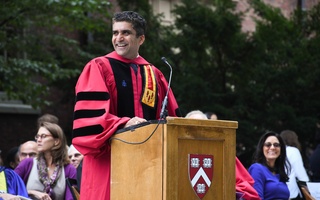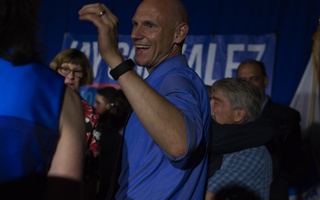I happen to like Andrés Manuel López Obrador (known lovingly as “Amlo”), Mexico’s president-elect. He’s boisterous, populist, and intent on cleaning house. Yet he’s nothing like Trump. He might even be an antidote to the Trump effect, if the Democrats are willing to learn from him.
Amlo’s politics, called “Cardenismo,” are based on the legacy of Lázaro Cárdenas, Mexico’s president during the Great Depression. He championed a government-led recovery built on public works projects and intervention in key industries. He fostered the young Confederation of Mexican Workers, still the country’s largest union (with over 11,000 chapters). He drafted women’s suffrage legislation, though it would take 16 years to become law.
Amlo seems to take this legacy seriously. As mayor of Mexico City in the early 2000s, he adopted a pension plan for the city’s elderly and revamped much of the city’s transit infrastructure. Now, he’s promising to repave Oaxaca’s roads and establish rail lines across the southern gulf region. Maybe a tall order, but it suggests a pleasant optimism for a Mexican president-elect.
Since entering politics in the late seventies, López Obrador has held a number of different political affiliations.
In 1976, he joined the center-right Institutional Revolutionary Party, whose big-tent model he now plans to adopt for his own “Morena” coalition. By the late eighties, he had joined the new social-democratic Party for the Democratic Revolution, founded and run by the son of the ex-president Cárdenas. In 2014, he co-founded the National Regeneration Movement, the Cardenist labor party to which he now belongs.
The stiff nomenclature belies López Obrador — who is unmistakably of-the-people. On the issues, he has been remarkably steady since his first run in 2006: larger pensions for the poor and elderly (and smaller ones for ex-presidents), full integration of southern Mexico (by far the country’s poorer half) into the national economy, and public-private partnership where possible. In a country with a history of crowded politics (especially on the left), it’s important that Amlo dodges partisan classification.
This is one area where Amlo-style leadership could bolster the rebounding (but volatile) American left. In an increasingly diverse and ideologically wide political landscape, the Democratic brand has itself come into question. (Do the Clintons still own the party? How radical is too radical?) Amlo refuses these questions with his newest political project. The National Regeneration Movement is intentionally big-tent, channeling the fervor of ex-Zapatistas and ex-PRI members to the same ends.
Economically, Amlo is hardly as maverick as either Trump or 2016 Democratic contender Bernie Sanders, both of whom spoke of trade partnerships in the fast-and-loose way of ideologues.
On NAFTA, he’s pragmatic to the core (and far from the radical socialist some have painted him to be). In a letter to Trump regarding a NAFTA agreement, he spelled out in clear terms his top priority of ending “uncertainty [that] could slow investments.” On domestic issues, he’s promised to balance the budget, protect central bank autonomy, and wean public officials from private air travel. These concerns are about as sensible as they come.
The key takeaway is problem-solving. For the Democrats, that might mean funding a full recovery effort in Puerto Rico, revamping campaign finance scrutinies, and stabilizing (while still revising) NAFTA — positions consistent with both the Sanders and Clinton wings and broadly supported by the public.
I don’t claim that López Obrador is totally satisfying. Socially, he is much closer to the Mexican mainstream (and even right) than I would like, often sidestepping questions on women’s and LGBT rights. This is a clear problem in a country where 70 percent of women have reported sexual assault or domestic violence.
But López Obrador is no worse in this regard than Enrique Peña Nieto, Mexico’s current president, who will leave office in December having ignored a “pandemic” of misogynistic violence. And the Democrats need not draw lessons from this aspect of Amlo. Instead, we might observe his pragmatic craft — how he channels the legacy of Mexico’s New Deal to modern ends — for lessons.
American leaders, after all, have been known to look across the pond for lessons in turbulent moments. What say we look south this time?
Henry N. Brooks ’19 is a Social Studies concentrator living in Currier House. His column appears on alternate Thursdays.
Read more in Opinion
Harvard Should Establish an Internal Carbon Tax

















